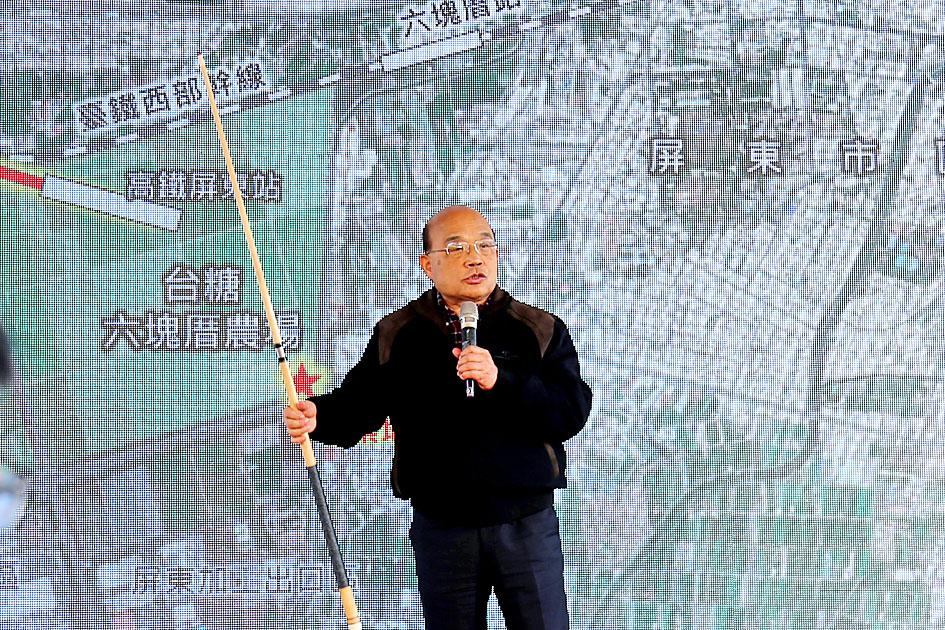While the Executive Yuan is considering setting up science parks in Pingtung and Chiayi counties, there is some criticism about whether science parks are needed in every city and county.
Minister of Science and Technology Wu Tsung-tsong (吳政忠) on Wednesday told a news conference that the government is planning a new type of science park on less than 100 hectares to promote innovative, energy-saving businesses and improve community relations.
Wu’s remarks came after Premier Su Tseng-chang (蘇貞昌) visited Pingtung on Sunday to inspect the planned site for a new high-speed railway station and announced a plan to establish a new science park.

Photo: Chiu Chih-jou, Taipei Times
Su on Dec. 19 last year inspected industries in Chiayi, where he promised to evaluate the possibility of setting up a science park.
He reaffirmed the promise after dining with Democratic Progressive Party (DPP) lawmakers on Wednesday night — the eve of the second anniversary of his premiership.
However, some Internet users have questioned whether the plans would only benefit business speculators and why some science parks in agricultural regions, such as in Changhua County, lay idle.
Citizen of the Earth, Taiwan deputy executive director Tsai Chung-yueh (蔡中岳) said that the government should develop detailed plans for parks before announcing them.
First, it should determine which plots of idle land are not part of proposals and find out what resources are needed by Taiwanese businesses returning home, he said.
Instead of developing separate plans, the science ministry and the Ministry of Economic Affairs — which oversees industrial parks — should communicate, he added.
The government should make plans from the perspective of national spatial planning and tell the public what might be sacrificed by erecting new science parks, he said.
If science parks are to house businesses related to semiconductors and electronics, the government should assess how much water and electricity would be needed, and push the companies to commit to using renewable energy sources, he said.
Making promises without proper advanced planning is irresponsible, Tsai said, questioning whether such a policy would truly benefit local development.
While most spaces at the Hsinchu Science Park, the Central Taiwan Science Park and the Southern Taiwan Science Park are occupied, some of their branches are not efficiently used, science ministry data showed.
Overseen by the Hsinchu Science Park Bureau, the Yilan Science Park and the Tongluo Science Park in Miaoli County are only 24 percent and 63 percent rented respectively, the data showed.
Water and electricity are not a problem at the planned site in Pingtung, but could be more of a challenge in Chiayi, Minister of Economic Affairs Wang Mei-hua (王美花) said on Thursday, adding that the government would evaluate whether to build a seawater desalination plant in Chiayi.
Additional reporting by CNA

A strong continental cold air mass is to bring pollutants to Taiwan from tomorrow, the Ministry of Environment said today, as it issued an “orange” air quality alert for most of the country. All of Taiwan except for Hualien and Taitung counties is to be under an “orange” air quality alert tomorrow, indicating air quality that is unhealthy for sensitive groups. In China, areas from Shandong to Shanghai have been enveloped in haze since Saturday, the ministry said in a news release. Yesterday, hourly concentrations of PM2.5 in these areas ranged from 65 to 160 micrograms per cubic meter (mg/m³), and pollutants were

Taiwan’s armed forces have established response protocols for a wide range of sudden contingencies, including the “Wan Chun Plan” to protect the head of state, the Ministry of Defense (MND) said today. After US President Donald Trump on Saturday launched a series of airstrikes in Venezuela and kidnapped Venezuelan President Nicolas Maduro, concerns have been raised as to whether China would launch a similar “decapitation strike” on Taiwan. The armed forces regularly coordinate with relevant agencies and practice drills to ensure preparedness for a wide range of scenarios, Vice Minister of National Defense Hsu Szu-chien (徐斯儉) told reporters before a

EVA Airways on Saturday said that it had suspended a pilot and opened an investigation after he allegedly lost his temper and punched the first officer several times as their plane was taxiing before takeoff at Los Angeles International Airport. According to a report published on Thursday by The Reporter, the incident occurred after the flight’s Malaysian first officer tried to warn the Taiwanese pilot, surnamed Wen (文), that he was taxiing faster than the speed limit of 30 knots (55.6kph). After alerting the pilot several times without response, the first officer manually applied the brakes in accordance with standard operating

NOT AN OPENING: Trump’s violation of international law does not affect China’s consideration in attacking Taiwan; Beijing lacks capability, not precedent, an official said Taiwanese officials see the US’ capture of the president of Venezuela as a powerful deterrent to Beijing’s aggression and a timely reminder of the US’ ability to defeat militaries equipped with Chinese-made weapons. The strikes that toppled Venezuelan President Nicolas Maduro signaled to authoritarian leaders, including Chinese President Xi Jinping (習近平), US President Donald Trump’s willingness to use military might for international affairs core to US interests, one senior official in Taipei’s security circle said. That reassured Taiwan, the person said. Taipei has also dismissed the idea that Trump’s apparent violation of international law could embolden Beijing, said the official, who was not